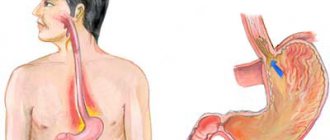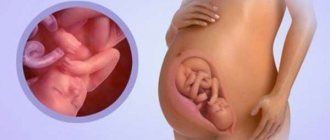Physiological reasons
It is clear that the body of a pregnant woman functions somewhat differently than the body of an ordinary person. Decreased muscle tone, changes in hormonal levels, compression of adjacent organs by the uterus - all these are factors that provoke belching of eggs during pregnancy.
That is, there are a number of reasons that do not require serious intervention and special treatment - it is enough to correct the pregnant woman’s lifestyle and the situation will improve. These reasons include:
- overeating (eating too much food, taking a long break between meals);
- abuse of “heavy” foods – fatty, fried, spicy foods;
- habit of going to bed immediately after eating.
All of the above can be easily eliminated, as a result of which burping rotten eggs will quickly disappear. A woman, especially in the second half of pregnancy, must follow the following rules:
- eat fractionally, that is, in small portions at short intervals;
- do not take a horizontal position immediately after finishing a meal;
- adhere to healthy eating rules;
- drink enough water.
Traditional methods of treatment and prevention
- Calamus rhizome powder
. Take a third of a teaspoon before meals; - Centaury infusion
. Pour 10 grams of centaury herb with a glass of boiling water and leave for 3 hours. Take 1 tablespoon 30 minutes before meals with each meal; - Tea with lemon balm or mint
; - Heather decoction
. Pour 15 grams of heather into 0.5 liters of water and boil for 5 minutes. Take a third of a glass 3-4 times a day; - Mint essence
. Add 2-3 drops of mint essence to a glass of water. Take daily for 15 days; - Ginger tea
. Take daily after meals; - Soda
. Add a teaspoon of baking soda to a glass of water. Take when belching.
Additionally , in order to eliminate pathological belching, it is necessary to treat the underlying disease. In most cases, the woman is hospitalized and therapeutic measures are carried out under the supervision of a gastroenterologist, surgeon and therapist.
Pathological causes
Belching rotten eggs during pregnancy, as well as in any other period of life, can be associated with a fairly large number of diseases of the digestive canal. Most often this is an infectious pathology, especially if during pregnancy rotten belching is combined with diarrhea (salmonellosis, giardiasis, etc.). Other options are also possible:
- exacerbation of peptic ulcer;
- hypoacid gastritis;
- pathology of the biliary tract.
Pregnancy and any chronic pathology in a woman’s body have the so-called mutual burden syndrome. That is, pregnancy causes an exacerbation of all chronic pathologies and, conversely, a chronic disease complicates the course of pregnancy. That is why it is better for a pregnant woman not to put off visiting her doctor to clarify the situation. Only a specialist will help you find the answer to the question of what to do if belching of rotten eggs occurs during pregnancy.
Many pregnant women experience burping of rotten eggs and begin to panic. Don't worry, it's quite simple.
Diagnostics
If signs of nausea and belching appear during pregnancy, you should consult a gastroenterologist. During the consultation, he will advise the expectant mother what to do in such cases and prescribe a diagnosis.
Most often, a gastroenterologist prescribes a pregnant woman to undergo fibrogastroscopy. This is a fairly informative and accurate method of checking the health of the esophagus, stomach, and intestines for various pathologies. Such diagnostics help to detect duodenitis, gastroduodenitis, gastritis, ulcers and other dangerous gastrointestinal diseases.
The entire procedure lasts no more than a quarter of an hour and does not bring significant discomfort to the woman. You shouldn't be afraid of her, she won't do any harm. A hose with a light source is inserted into the esophagus through the mouth. Since the pharynx is treated with an anesthetic solution, there is no pain.
Sometimes it is indicated to take a piece of tissue from the esophagus or stomach for examination. This procedure is called a biopsy. The accuracy of microscopic examination of a tissue fragment is very high.
Causes
- One of the main reasons for belching rotten eggs during pregnancy is poor nutrition, especially overeating.
It can also signal the presence of an ulcer, inflammation of the mucous membrane of the stomach and intestines, or liver disorders. Go to a gastroenterologist and do FGS.
Of course, another reason is toxicosis in pregnant women.
Prolonged horizontal position, turns from side to side, even low bends can provoke belching.
How to get rid
How to get rid of belching? This question is asked by many pregnant women. The good news is that no special treatment is required. Firstly, this will go away after childbirth, and secondly, most of the reasons for the appearance of such an unpleasant symptom are purely physiological.
To get rid of belching while carrying a child, it will be enough to exclude from the menu foods that provoke active gas formation in the gastrointestinal tract. This means that for a while you need to say goodbye to legumes, grapes, baked goods and cabbage. You should also limit rye bread, potatoes, and oatmeal: due to the consumption of large quantities of such products, people often burp intensely.
You should also give up such a common and bad habit as eating dry food. It provokes excessive gases into the gastrointestinal tract. Carbonated water, especially sweet water, is also harmful to pregnant women. It would probably be unnecessary to remind once again that drinking alcohol and smoking are strictly contraindicated for pregnant women. It is these habits that provoke intense gas formation.
You need to train yourself to eat small portions and often. And if you drink some clean water half an hour before meals, this will also protect you from the risk of overeating, which is dangerous during pregnancy.
Interesting! A child spits up blood - what is the danger?
You should definitely include fermented milk dishes, soft-boiled eggs, boiled meat or fish in your diet. Baked apples are very useful. You should not wear clothes that squeeze your body.
Belching and its causes in pregnant women
Belching is the spontaneous release of air from the stomach into the esophagus, into the mouth and out. There are many reasons for the occurrence of this phenomenon in women carrying a child:
Arbitrary release of air is provoked by certain physiological factors:
- When a pregnant woman lies on her back and suddenly turns onto her side.
- The expectant mother does not follow the prescribed diet. The diet contains fried, spicy, fatty foods, in quantities greater than they should be.
- Bend forward to put on shoes.
The phenomenon of belching during pregnancy must be combated, no matter in the first trimester or in the last term. Spontaneous release of air at the beginning of an interesting situation requires a visit to a doctor and his consultation.
The essence
Belching in pregnant women, as well as in other people, is a normal and physiological phenomenon. However, we must remember that belching during pregnancy can appear due to active hormonal changes in the body.
The reasons for this also lie in the increasing size of the uterus. She needs more space in the abdominal cavity, which is why not only constant belching occurs, but also large amounts of gas are formed, and heartburn appears during pregnancy.
During the process of belching, air is released from the stomach through the esophagus tube and further through the oral cavity. This can often occur after eating, including in the first trimester. At times it can be sour. Why is this happening? The reasons are that sometimes stomach contents enter the lower part of the esophagus. It irritates the esophagus, so sometimes a woman is bothered by belching and heartburn.
However, sometimes it happens that heartburn and belching are a sign of pathology in the body.
Types of burps
Infrequently repeated, odorless and unaccompanied by unpleasant sensations, emitted gases are acceptable to ignore. If you experience discomfort, an unpleasant odor or heartburn, there is reason to worry.
Burping rotten eggs
The food remaining after the digestion process and not exposed to acid and enzymes accumulates in the stomach and another process begins - rotting. The breakdown of proteins occurs slowly, the smell of rotten eggs appears, scientifically - the smell of hydrogen sulfide.
The main period of gestation when a similar phenomenon is observed is in the second trimester and during late pregnancy. Sometimes it is accompanied by heartburn if unhealthy foods are consumed: fast food, fatty, fried.
Diarrhea, belching, and other uncomfortable conditions may go away in a few minutes or last for three hours, indicating problems with the stomach.
In the last stages of pregnancy, a hydrogen sulfide smell appears because the baby growing inside puts pressure on the digestive organs. The food stagnates, rotting occurs and a “flavor” appears. It is most often observed in a supine position, when the fetus puts especially intense pressure on the stomach.
A growing child is not always to blame for the appearance of gases with rotten eggs. A gastrointestinal disease or one that occurs during toxicosis becomes a source of unpleasant phenomena: ulcers, inflammation of the mucous membrane, liver dysfunction, disruption of the gallbladder.
Constant belching with diarrhea or vomiting indicates the poor quality of the previously eaten product. Self-medication will not work - only seeking medical help, since the unborn baby is at risk.
Survey
The appearance of belching during pregnancy often indicates a specific gestational pathology or exacerbation of a chronic gastrointestinal disease against the background of hormonal changes. The examination is prescribed by a gastroenterologist with the obligatory participation of an obstetrician-gynecologist in making a diagnosis and selecting therapy. All patients are required to undergo a comprehensive examination using laboratory and instrumental methods that do not pose a danger to either the mother or the fetus. For diagnostic purposes the following are used:
- Ultrasonography
. Ultrasound of the abdominal cavity is the main instrumental diagnostic method, since this study is absolutely harmless to the child. Sonography allows you to identify signs of inflammatory processes and morphological changes in the gastrointestinal tract. The study is not informative enough in late pregnancy due to significant enlargement of the uterus. - Intragastric pH-metry
. The occurrence of acid belching during gestation usually occurs against the background of disturbances in the secretion of hydrochloric acid, therefore 24-hour measurement of acidity levels in the stomach is recommended. Additionally, pH measurements of the esophagus are performed - a decrease in the level to less than 4 indicates gastroesophageal reflux. - Breath test
. To exclude gastrointestinal pathology due to H. Pylori infection, a non-invasive respiratory test is prescribed, based on the ability of the bacterium to break down urea in the stomach. The method sometimes gives false negative results, so to clarify the diagnosis, a specific fecal antigen in the blood is additionally determined. - Laboratory blood tests
. All patients are shown a standard biochemical blood test, which can detect signs of protein-energy deficiency and detect problems in the functioning of the hepatobiliary system. According to indications, it is recommended to study blood plasma for the level of gastrin and pepsinogen, and determine the main hormones. - Endoscopy
. Endoscopy is used during gestation according to strict indications, in cases where belching is accompanied by other dyspeptic disorders. The study allows you to examine the mucous membrane of the esophagus and stomach, and visualize inflammatory foci. The endoscopic method is highly informative in assessing the contractile function of muscle sphincters.
The list of mandatory examination methods also includes a coprogram that detects specific changes in feces due to inflammation, fermentopathy, maldigestion and malabsorption, an analysis for helminth eggs, and Gregersen’s reaction to occult blood. If inflammatory bowel disease is suspected, pregnant women undergo sigmoidoscopy and colonoscopy with extreme caution.
During pregnancy, you need to reconsider your diet
Belching treatment
The specialist prescribes the necessary treatment for belching. The first thing doctors advise is to follow a diet. Make small portions of food, take them at a certain time, about 5-6 times. It is recommended to exclude from the diet foods that cause fermentation in the intestines: cabbage, grapes, etc. Reduce the consumption of potatoes, bread and oatmeal.
Eating dry food and drinking carbonated drinks will not do any good. Bad habits will have to be abandoned; they are harmful to the child’s health and negatively affect the digestive organs. A glass of plain water 30 minutes before meals - drink in small sips. Thoroughly chewed food is better absorbed and creates less unpleasant sensations: heaviness, belching, heartburn. It is not advisable to eat before bed.
Drug therapy
Diet is not always able to cope with the discomfort that arises. Then medications come to the rescue.
- Maalox. A drug that can help a pregnant woman get rid of belching and heartburn. Thanks to the substances contained in the medicine, when it enters the stomach, hydrochloric acid is neutralized, enveloping the walls of the stomach and protecting the mucous membrane.
- Rennie. Tablets that can remove excess acidity prevent belching.
- Phosphalugel. Available in the form of a suspension that acts instantly. Neutralizes hydrochloric acid, which is found in excess in gastric juice, relieves belching.
The expectant mother must remember that not a single medicine, even the most harmless one, should be taken without first consulting a doctor.
Folk remedies
In the fight against belching, traditional medicine comes to the rescue; the intake is supervised by a specialist.
- Plantain and cardamom. Sold dry. Medicinal herbs are placed in boiling water, boiled, cooled and the drink is ready. Tablespoon before meals.
- Cranberries in any form. A rich set of microelements will be useful not only for the mother, but also for her child.
- Mint tea or lemon balm tea will help with hydrogen sulfide belching. The nervous system is restored, stomach cramps disappear, and the digestion process returns to normal.
- Chamomile tea stops spasmodic actions in the esophagus and eliminates inflammatory processes in the stomach. Performs a bactericidal effect, reduces food stagnation, and prevents putrefactive reactions from occurring.
The happy end of pregnancy and the life of the child are in the hands of the woman.
What can you eat if you have diarrhea during pregnancy?
In case of gastrointestinal disorders, it is important for expectant mothers to follow a strict diet in order to “unload” the digestive organs, eliminate foods that cause diarrhea, and create the right diet.
It is better to fast on the first day. Drink water, strong tea, and rice water throughout the day. If fasting is difficult, eat some white bread crackers.
What can pregnant women do against diarrhea on the second day:
- oatmeal or rice porridge in water without sugar or salt;
- tea, fruit drink, still water;
- dried wheat slices;
- diet bread;
- vegetable or light chicken broth;
- fresh kefir, fermented baked milk, yogurt.
Menu for a pregnant woman with diarrhea on the third day:
- porridge with steam cutlet;
- light soup;
- boiled or stewed vegetables.
Follow this diet for a week. Drink compote, jelly, mint and chamomile tea. Completely eliminate fried, smoked and spicy foods, as well as milk. Try to eat sweets, fatty, salty and sour foods as little as possible.
Normal or pathological?
The involuntary release of air from the oral cavity is a consequence of changes in the hormonal levels of the body. These types of changes affect the functioning of the gastrointestinal tract. Belching is the sudden release of air from the mouth that entered the gastric or esophageal area shortly before the onset of this symptom. In this case, air escapes from the oral cavity.
Why does sour or rotten burp appear? This occurs due to the penetration of gastric juice into the lower part of the esophagus. As a result of this process, irritation of the mucous membrane occurs, during which gases are released. This phenomenon is quite unpleasant, but almost all women have to face it during pregnancy.
Helpful information! Belching of sour contents or rotten eggs occurs mainly during the second trimester. This symptom appears quite often and lasts after eating for two or more hours.











